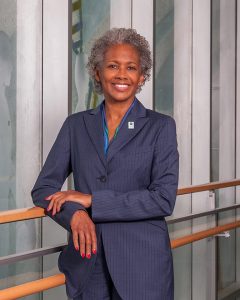
President Blake pinpoints four critical areas at 100th day address

On Nov. 15, University of Houston-Clear Lake President Ira Blake presented her 100th day address to a full audience in the UHCL Bayou Theater.
Blake began her address by expressing her appreciation to UHCL faculty, staff, students, alumni and the neighboring community for the warm welcome that she received since her first day as president.
She continued with an evaluation of the effects of Hurricane Harvey on the UHCL community, noting that her first decision as UHCL President was to close the university before it opened for the semester. She shared her gratitude to all those who had a hand in the university’s outreach efforts during the storm, as well as to those who came together to help those in need.
“We are a community of care, commitment and cooperation, but more so, we are also tough,” Blake said.
She then moved on to a discussion of the UHCL mission and goals for the future, emphasizing a strategic planning process that is to start in the spring 2018 semester.
The plan will include a review of UHCL policies, which is to be overseen by Carol Carman, associate professor of educational research and chair of the University Life Committee (ULC), one of the three shared governance committees of the University of Houston system.
Carman shared that University Life has formed three working groups. “The first one is to go through our own [ULC’s] bylaws and edit our bylaws,” Carman said. “The second one hopes to interface with all the different groups on campus with policies and procedures to make a webpage, working with the Office of Communications, where you can find links to all the policies and procedures on UHCL’s campus.The third group is policy management, which will suggest a framework, working with UCT, on how to track policies and also look at sun setting or expiring policies.”
Blake proceeded to explain that the direction of the strategic plan is for UHCL to become “the university of choice,” pinpointing four “critical areas” within the university’s history that she feels need to be examined as part of the strategic plan.
The first area, which Blake referred to as educational excellence, was broken down into three subgroups. These groups included providing resources to faculty to ensure that UHCL’s educational excellence is upheld, implementing peer learning experiences, and career exploration through arrangements with businesses, organizations, and partnerships with UHCL alumni.
Blake’s second critical area, “Who We Serve,” noted the importance of identifying the demographic information, strengths, weaknesses and interests of the students that UHCL serves. Blake said that by doing so, UHCL could hope to better fulfill the wants and needs of its students and increase enrollment. Increasing enrollment is necessary to lower the financial deficit that the university is currently handling through operational budget cuts, tapping into reserves and not filling all vacant positions.
“Each and every student that we recruit and enroll has an impact on our financial health. These sources of revenue directly shape our ability to operate organizationally and educationally,” Blake said.
The third critical area Blake focused on was “Strategy in Enrollment Management,” in which Blake stressed the need for targeted advising for student subgroups, academic support for those targeted groups and career development that connects majors to jobs. She also mentioned the importance of knowing what it means to be a Hispanic Serving Institution, as well as the importance of having just as many part-time students as full-time students.
Blake’s last topic of discussion was “Community Building.” She commended the UHCL community and surrounding service region for its level of community building, engagement and diversity. Her praise was followed by encouragement to review how we create such strong community engagement and to expand on our current efforts to become a “model of inclusive engagement.”
“We all want our students’ futures to be satisfying, productive and contributing,” Blake said. “The effort we put into strategic planning and our continued determination to deliver to them the most enriching and challenging educational experiences will help to accomplish that.”
